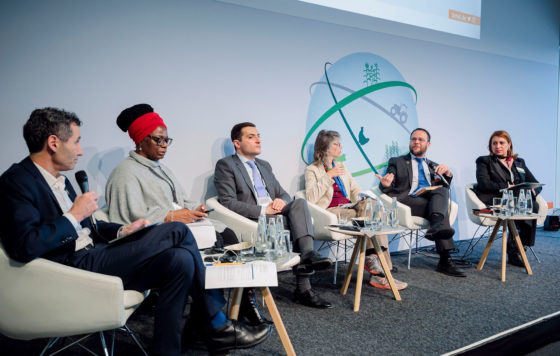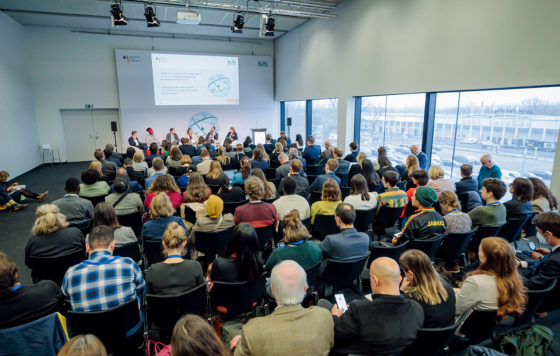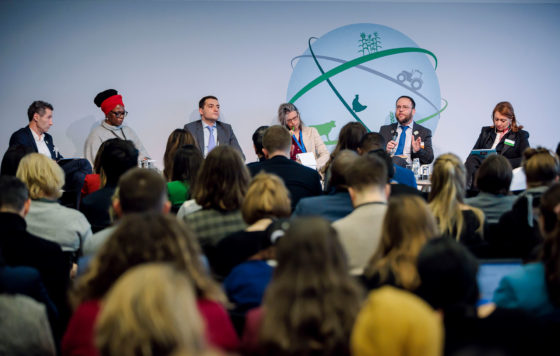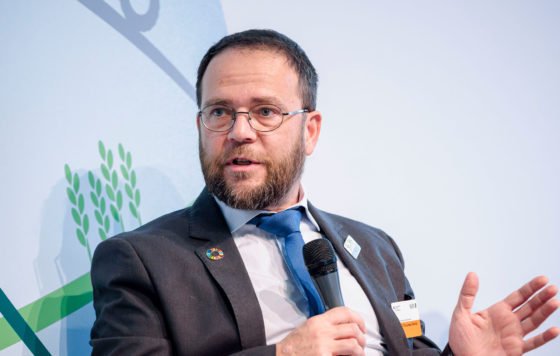Leveraging urban and local food systems for sustainable food systems transformation
Time: Friday, 20. January 2023, 11:30 a.m. – 1:00 p.m.
Room: M4-M5
Languages: English, German, French
Summary:
The panel was introduced by FAO Chief Economist Maximo Torero and the Moderator, Raimund Jehle, presenting the background for discussion.
As the Chairperson of the UN Committee on World Food Security, Gabriel Ferrero started the debate focusing on the value of a new Governance approach, and on the importance of the local dimension of food systems, now being recognized also in the CFS.
The local perspective was ensured by the two representatives of cities in the panel: the Mayor of Tunis, Souad Abderrahim and Asher Craig, Deputy Mayor of Bristol.
Calling for more visibility and education on food systems and nutrition, the former shared practical projects co-implemented by the municipality, especially to address local lack of capacity building.
Other examples were shared by Bristol, with Asher Craig focusing on the financial aspects of multi-stakeholder collaborations, and the involvement of different actors in decision-making.
Private sector was at the center of the intervention by Armen Harutyunyan, from The Eurasian Economic Commission, advocating for innovative acquisitions to be scaled up at the local level.
Brining in an academic perspective, Jane Battersby from the University of Cape Town listed some important key issues that urbanization will pose, and how these will reshape food systems and their governances.
The panel presented practical ways to get cities recognized in food systems transformation.
These include participatory governance instead of top-down approaches, innovative entry points and platforms such as the new Urban Food Systems Coalition.
Keynote Speaker
Panel Guests
Armen Harutyunyan was appointed Director of Agricultural Policy Department on November 2020. Before joining the Commission, he was Senior Advisor at the Global Center for Technology, Innovation and Sustainable Development in Singapore and previously Team Leader, Partnership and International Finance Officer at the United Nation in Armenia. Before starting career in international organizations, he served over five years as the Deputy Minister of Agriculture of Armenia and coordinated international trade, institutional reforms and international cooperation at the Ministry. He lectured Food Economics at the American University of Armenia and Behavioral Economics at the Executive MBA program at the Yerevan State Medical University. Armen Harutyunyan holds Master’s Degree in International Development from University of Bristol and Master of Public Administration Degree from Armenian State Public Administration Academy, as well as two year comprehensive certified program of the Texas A&M University in Armenia. He had completed executive education programs at Harvard, Stanford, UCL, London School of Public Relations and others. He is Fintech and Blockchain Fellow at the Singapore University of Social Sciences and Academic Council Member at the Global Fintech Institute.
Asher was elected as the Labour Councillor for the ward of St George West, Bristol in May 2016 and was appointed to the Cabinet with the wide reaching portfolio of Neighbourhoods in August 2016.
In March 2017 Asher was asked to step into the new role of Deputy Mayor – Communities, bringing into & elevating the issue of Public Health within her new portfolio. She is committed to address the inequities and multi-level public health risks that impact diverse urban populations through the lens of racial and ethnic health disparities at all levels. This has included work towards a more holistic, sustainable, inclusive and healthier food system, resulting in Bristol achieving Gold Sustainable Food City status in 2021 and building upon this momentum to produce the Bristol Good Food 2030 Framework and Actions plans in 2022.
In October 2021 she was appointed to a new portfolio comprising Children’s Services, Education and Equalities.
One of Asher’s proudest achievements is the development of a new groundbreaking and multiple award-winning Stepping Up leadership programme, using the Bristol “One City Approach”.
Asher is a member of Avon & Somerset Police & Crime Panel, trustee of a national education charity and awarding body and the proud mother of 3 daughters.
Moderation






